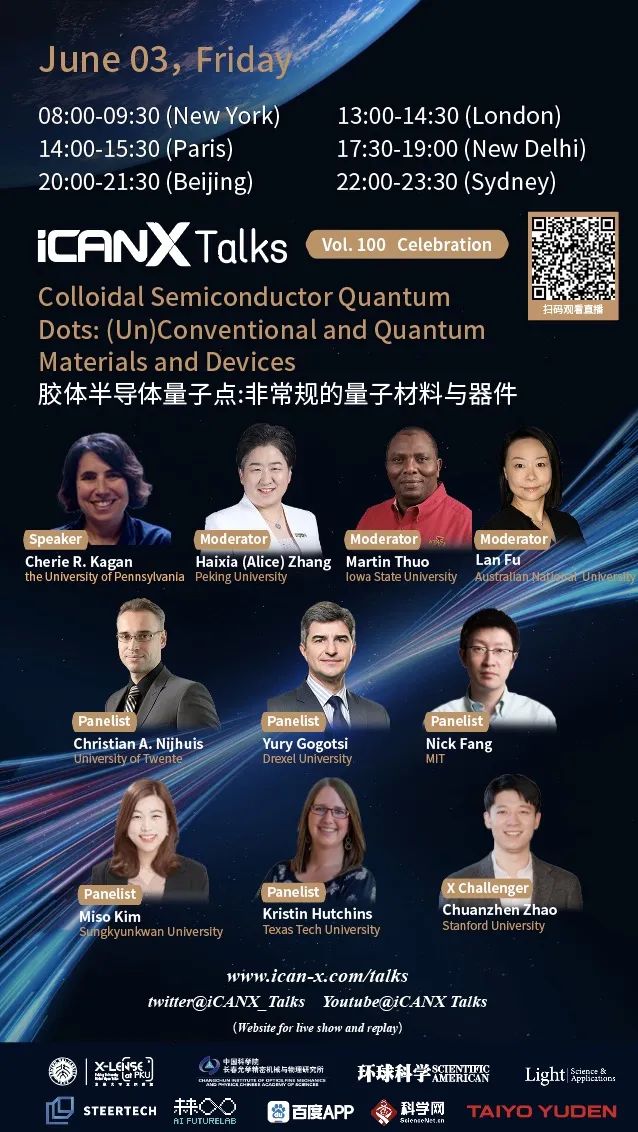[Lecture] Colloidal Semiconductor Quantum Dots: (Un) Conventional and Quantum Materials and Devices
Jun. 03, 2022
Speaker: Cherie R. Kagan, University of Pennsylvania
Time: 20:00-21:30, June 3, 2022 GMT+8
Moderator:
Haixia (Alice) Zhang, Peking University
Martin Thuo, Lowa State University
Lan Fu, Austrailian National University
Venue: Scan the QR code
Abstract: Colloidal semiconductor quantum dots (QDs) are typically 2-20 nm diameter fragments of the bulk solid. They are known as “artificial atoms” since electrons, holes, and excitons are quantum-mechanically confined and occupy discrete electronic states. Advances in wet-chemical synthetic methods enable the preparation of QDs tailorable in size, shape, composition, and surface chemistry. As colloids, these QDs are readily dispersed in solvents and deposited using solution-based methods. They can self-assemble to form glassy or crystalline QD solids or be directed to assemble to deterministically position single or countable numbers of particles. I will focus on routes to design solid-state QD materials by manipulating the QD surface chemistry to strengthen electronic coupling, by exchanging the ligands used in synthesis for more compact chemistries, and QD doping, by introducing atoms and ions that serve as impurities or modify stoichiometry. These approaches allow us to control the carrier type and concentration and design high mobility n- and p-type materials. Ultimately, I will connect QD material design to their physical properties and their application in (un)conventional, solution-processable, and flexible electronic and optoelectronic devices. I will also give an outlook on the opportunity to exploit QDs as platforms for quantum information science, in particular as optically addressable qubits, and share work on the deterministic assembly and optical study of colloidal nanodiamonds.
Biography: Cherie R. Kagan is the Stephen J. Angello Professor of Electrical and Systems Engineering, Professor of Materials Science and Engineering, and Professor of Chemistry at the University of Pennsylvania. She is Penn Engineering’s Associate Dean for Research and is also the Director of the newly awarded National Science Foundation Engineering Research Center for the Internet of Things for Precision Agriculture. She graduated from the University of Pennsylvania in 1991 with a BSE in Materials Science and Engineering and a BA Mathematics and earned her PhD in Materials Science and Engineering from the Massachusetts Institute of Technology in 1996. In 1996, she went to Bell Labs as a postdoctoral fellow and in 1998, she joined IBM’s T. J. Watson Research Center, where she most recently managed the “Molecular Assemblies and Devices Group.” In 2007, she joined the faculty of the University of Pennsylvania. The Kagan group’s research is focused on studying the chemical and physical properties of nanostructured materials and in integrating materials with optical, electrical, magnetic, mechanical, and thermal properties in (mutli-)functional devices. The group combines the flexibility of chemistry and bottom-up assembly with top-down fabrication techniques to create materials and devices with applications in electronics, photonics, and sensing. Kagan was the 2021 President of the Materials Research Society and an Associate Editor of ACS Nano for 8 years.
Source: iCANX

